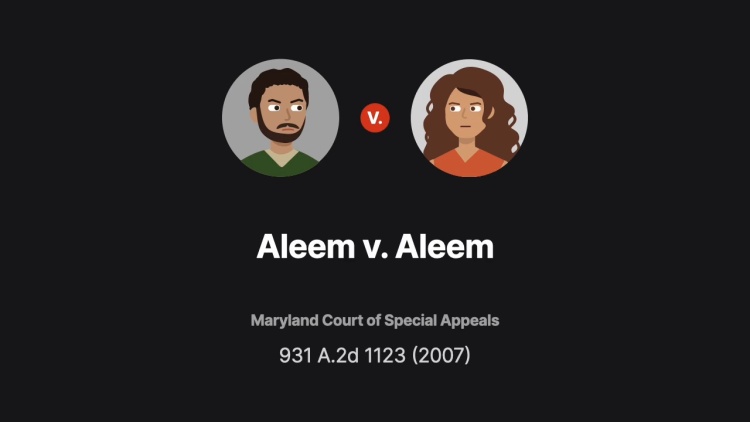Aleem v. Aleem
Court of Special Appeals of Maryland
931 A.2d 1123 (2007)

- Written by Sean Carroll, JD
Facts
Farah Aleem (wife) (plaintiff) and Irfan Aleem (husband) (defendant) were Pakistani nationals who married in Pakistan. The Aleems later moved to the United States. The wife was a homemaker, while the husband worked and earned a pension. The wife sued the husband for divorce in the Circuit Court for Montgomery County. While the proceeding was ongoing, the husband divorced the wife by talaq under Pakistani law at the Pakistani Embassy in Washington, D.C. The husband presented evidence at trial that, under Pakistani law, a divorce by talaq did not include any division of marital property held in the husband’s name, as property was distributed to the individual who held title. The trial court declined, however, to hold an evidentiary hearing on the issue of whether to grant comity to the Aleems’ divorce by talaq. The husband also presented a copy of the Aleems’ marriage contract, which did not address most of the marital property at issue. A Maryland statute stated that the state’s policy was to distribute marital property based on fairness and equity. The husband filed a motion to dismiss the wife’s suit, asserting that all issues had already been decided under Pakistani law. The circuit court denied the husband’s motion. The circuit court granted the wife an absolute divorce and ordered the husband to pay the wife half of his pension on a monthly basis. The husband appealed.
Rule of Law
Issue
Holding and Reasoning (Rodowsky, J.)
What to do next…
Here's why 907,000 law students have relied on our case briefs:
- Written by law professors and practitioners, not other law students. 47,100 briefs, keyed to 996 casebooks. Top-notch customer support.
- The right amount of information, includes the facts, issues, rule of law, holding and reasoning, and any concurrences and dissents.
- Access in your classes, works on your mobile and tablet. Massive library of related video lessons and high quality multiple-choice questions.
- Easy to use, uniform format for every case brief. Written in plain English, not in legalese. Our briefs summarize and simplify; they don’t just repeat the court’s language.





